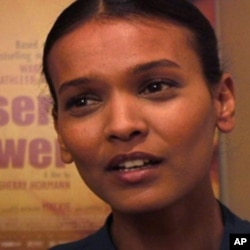The life of former supermodel Waris Dirie, who was born into a nomadic Somali clan in 1965, sounds like fiction. A goatherd by age six who cared for her family’s animals, Dirie ran away at 13 to avoid being sold into marriage.
That was the start of a remarkable journey, dramatized in the feature film “Desert Flower," based on Dirie’s autobiography.
Running away
It's the first major acting role for another top model, Ethiopian-born Liya Kebede.
“I think first of all, every time you want to play somebody who is real is always challenging and always scary, because you are given a responsibility of someone’s real life,” Kebede says. “So, definitely I was really intimidated and scared.”
As a child in a culture that practiced female genital mutilation (FGM), Dirie knew no other way of life. But when her father tried to marry her to an old man, she ran away. She walked for days across the desert, then hitchhiked to relatives in Mogadishu, evading both human and natural dangers. The following year, she leapt at the chance to go to London, to work as a maid at the Somali embassy.
In her autobiography, Dirie writes of her confusion at seeing white people and a flush toilet for the first time on the airplane that took her to a new life. For the next four years, she washed floors and dishes seven days a week and practiced speaking the English she heard on television. She also taught herself to read and write, since her employers discouraged her education.
Being discovered
At 18, faced with the likelihood of having to return to Somalia when the ambassador was recalled, Dirie fled again. She found refuge at a women’s hostel and got a job as a cleaner in a fast-food restaurant. That's where she was discovered by a well-known fashion photographer.
In the film, Juliet Stevenson - who plays a tough modeling-agency executive - briskly interrogates the young immigrant, asking her, “Why do you want to be a model?”
“Being a model is better than being cleaning lady,” Dirie replies.
“I was really touched by that kind of Cinderella story and the immigrant story and overall talking about FGM,” says Sherry Hormann, the Germany-based writer and director of "Desert Flower," “but in a way that you don’t lose a sense of humor, because I think that humor is the strongest weapon to survive.”
Fighting female genital mutilation
Hormann sees "Desert Flower" as more than an entertaining film biography. It’s also a broadside against FGM, a widespread practice in parts of Africa and Asia.
Like all her female relatives, Dirie was circumcised as a small girl, by a traditional female circumciser, an event the film dramatizes. Dirie’s clan practiced the most extreme form, in which all the external genitalia are cut off, and the remaining flesh stitched tightly together, leaving a hole the size of a pinhead for urination and menstruation.
That form of FGM is sometimes fatal, experts say. Girls can die from blood loss, shock or subsequent infections, as a sister and cousin of Dirie's did. Life-long pain, loss of sexual pleasure and other health problems, including high-risk childbirth, are virtually inevitable.
In "Desert Flower," Dirie is shocked to learn that not all women are cut. After struggling with physical and emotional pain, she ultimately seeks corrective surgery. The film dramatizes how in 1997, at the top of her modeling career, Dirie also became the first celebrity to speak out against FGM. She first told her story in a magazine interview and then in a speech at the United Nations. After being named a special U.N. representative on FGM, she left modeling to devote herself to the cause.
Making a difference
Actress Liya Kebede hopes the film will take Dirie’s message to all the places where FGM is still practiced. “I think the movie is very gentle and very sensitive, at the same time quite honest with things,” Kebede says. “I think it’s a wonderful story to watch, entertaining and fun, while addressing an issue that’s quite present, and especially in Africa.”
The film was shot partly in Djibouti, near the border with Somalia, and many of the actors are desert nomads from Dirie’s culture. Hormann says she fulfilled a promise to the people that she would return to show them the finished film. Several thousand attended the open-air screening in the desert, she says.
“At the end, it was silent, and a nomad father stood up and he said, ‘We at home we don’t talk about mutilation, we just do it. And I see it for the very first time. And none of my daughters, and I have six daughters, will ever be mutilated, ever.’ And after he stood up, many other fathers stood up. And at the end there were 23 fathers standing in the crowd. And you sit there as a filmmaker and you think, 'Wow, you can do something, baby steps, but you can do something.'”
"Desert Flower" has already been shown in Europe and South America, but is only now arriving in the U.S. as well as Ghana, Nigeria and South Africa. Dirie, now 46, lives in Austria, where she campaigns for women’s rights through her Desert Flower Foundation.





